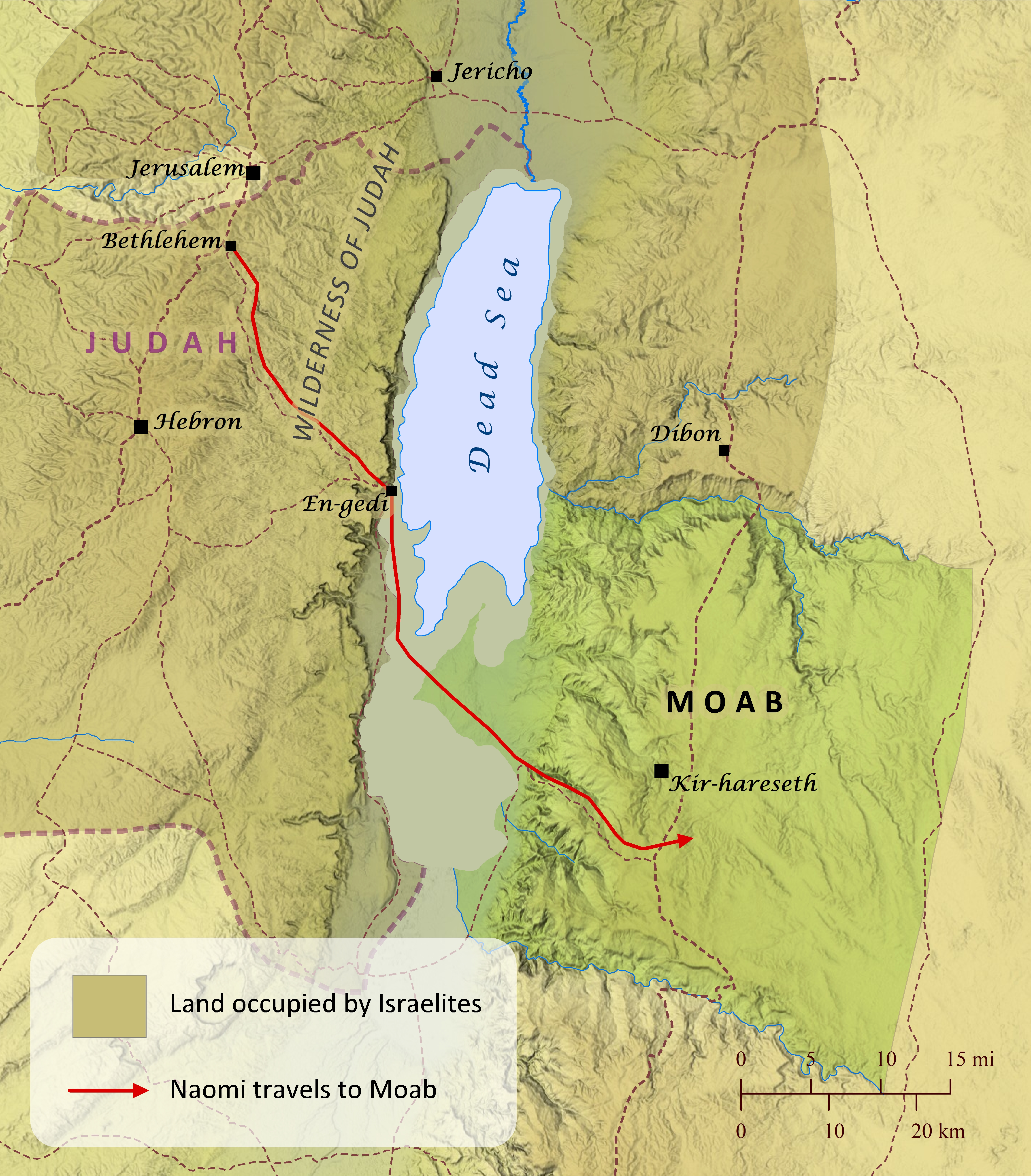Readers’ Version
Literal Version
4:1 Boaz takes over the land and gets Ruth as a wife
4 Meanwhile, Boaz went to the place inside the town gate (where people conducted their official business) and sat down there. Just as he had hoped, the man responsible for Naomi’s family came along—the man whom Boaz had mentioned earlier—and Boaz called out to him by name and said, “Come over here and sit down.” So the man came over and sat down. 2 Then Boaz called over ten of the older, well-respected men from the town and asked them to sit and witness their discussion, so they sat down with them. 3 Then Boaz asked the other relative, “The part of the countryside that belonged to our relative Elimelek is for sale. Naomi, who recently returned from Moab, is selling it. 4 I thought that I should tell you about it and in case you buy the land while the people sitting here are listening, including these leaders of our people. If you want to buy it back into the family, then do so. But if you do not want to buy it back, then let me know, because you are the closest relative to Elimelek, and I am next after you.”
“I’ll buy it,” the man replied.
5 “When you buy the land from Naomi,” Boaz continued, “you will also need to marry Ruth, our deceased relative’s widow from Moab, so that she’ll have a son who will inherit the property and continue Elimelek’s family line.”
6 “I can’t buy it back myself, then,” the closer relative answered. “If I did that, I would ruin my own son’s inheritance. You can have the land and the woman instead of me, because I simply can’t take it.”
7 (At that time in Yisrael, people had a different way of buying land or exchanging goods between them. In order to make these matters legally binding, one man would take off one of his sandals and give it to the other party. That was the way people in Yisrael confirmed what they had agreed to do.)[ref]
8 “You buy it yourself,” the relative said and he took off one of his sandals and gave it to Boaz. 9 Then Boaz said to the respected men and to all the other people who were there, “Today you have all witnessed that I’ve bought from Naomi all the property that belonged to Elimelek, Kilion, and Mahlon. 10 I am also taking Ruth, Mahlon’s widow from Moab, to be my wife so that she can have a son. Everyone will consider that son to be Elimelek’s descendant and he will inherit the property and carry on Elimelek’s family name among his relatives and here in his hometown.[ref] You’ve seen and heard that today and can tell anyone who asks about it.”
11 All the respected men, and the others who were sitting at the town gate, agreed, and they said, “Yes, we are your. We pray that Yahweh will allow this woman who will be coming into your home, to be like Rachel and Leah, the two who gave birth to our ancestors and started our people, Yisrael.[ref] May you become great in the clan of Efratah and famous here in Beyt-Lehem! 12 We pray that your family will be like the family of your ancestor Perez, son of Judah and Tamar, because of the many descendants that Yahweh will give to you and this young woman.”[ref]
2 And_he/it_took ten men of_elders_of the_city and_he/it_said sit here and_sat_down.
3 And_he/it_said to_the_redeemer the_portion_of the_field which belonged_to_brother_of_our belonged_to_ʼElīmelek Nāˊₒmī she_has_sold the_come_back from_country_of Mōʼāⱱ.
4 And_I I_said I_will_uncover attention_of_you to_say acquire_it before the_sitting and_in_the_presence_of the_elders_of people_of_my if you_will_redeem redeem and_if not he_will_redeem tell to/for_me and_know[fn] if/because there_is_not except_you to_redeem and_I after_you and_he/it_said I I_will_redeem.
5 And_ Boˊaz _he/it_said in/on_day buy_you the_field from_hand_of Nāˊₒmī and_from Rūt the_Mōʼāⱱitess the_wife_of the_dead you_have_acquired[fn] in_order_to_maintain the_name_of the_dead over inheritance_of_his.
6 And_he/it_said the_redeemer not I_am_able mmm[fn] to_me lest I_should_ruin DOM inheritance_of_my_own redeem to/for_yourself(m) you DOM right_of_redemption_of_my if/because not I_am_able to_redeem.
7 And_this in_former_times in/on/at/with_Yisrāʼēl/(Israel) on the_redemption and_for the_exchanging to_confirm every_of matter anyone he_drew_off sandal_of_his and_he/it_gave to_other_of_his and_this the_manner_of_attesting in/on/at/with_Yisrāʼēl/(Israel).
8 And_he/it_said the_redeemer to_Boˊaz acquire_it to/for_you(fs) and_removed sandal_of_his.
9 And_ Boˊaz _he/it_said to_the_elders and_all the_people are_witnesses you(pl) the_day if/because_that I_acquire DOM all_of that belonged_to_ʼElīmelek and_DOM all_of that belonged_to_Kilyōn/(Chilion) and_Maḩlōn from_hand_of Nāˊₒmī.
10 And_also DOM Rūt the_Mōʼāⱱitess the_wife_of Maḩlōn I_acquire to_me to/for_(a)_woman to_maintain the_name_of the_dead over inheritance_of_his and_not the_name_of it_will_be_cut_off the_dead from_among relatives_of_his and_from_gate_of native_place_of_his are_witnesses you(pl) the_day.
11 And_ all_of _they_said the_people which in/on/at/with_gate and_the_elders we_are_witnesses YHWH may_he_make DOM the_woman the_coming into house_of_your like_Rāḩēl and_as_Lēʼāh who they_built both_of_them DOM the_house_of Yisrāʼēl/(Israel) and_produce wealth in/on/at/with_ʼEfrātāh and_bestow a_name in_house_of leḩem.
12 And_let_it_be house_of_your like_house_of Pereʦ whom Tāmār she_bore to_Yəhūdāh/(Judah) from the_offspring which YHWH he_will_give to/for_yourself(m) from the_young_woman the_this.
4:4 OSHB variant note: ו/אדע: (x-qere) ’וְ/אֵֽדְעָה֙’: lemma_c/3045 n_1.1.1 morph_HC/Vqh1cs id_08fbk וְ/אֵֽדְעָה֙
4:5 OSHB variant note: קניתי: (x-qere) ’קָנִ֔יתָה’: lemma_7069 n_0.1 morph_HVqp2ms id_08cqw קָנִ֔יתָה
4:6 OSHB variant note: ל/גאול: (x-qere) ’לִ/גְאָל’: lemma_l/1350 a morph_HR/Vqc id_08Ynf לִ/גְאָל

